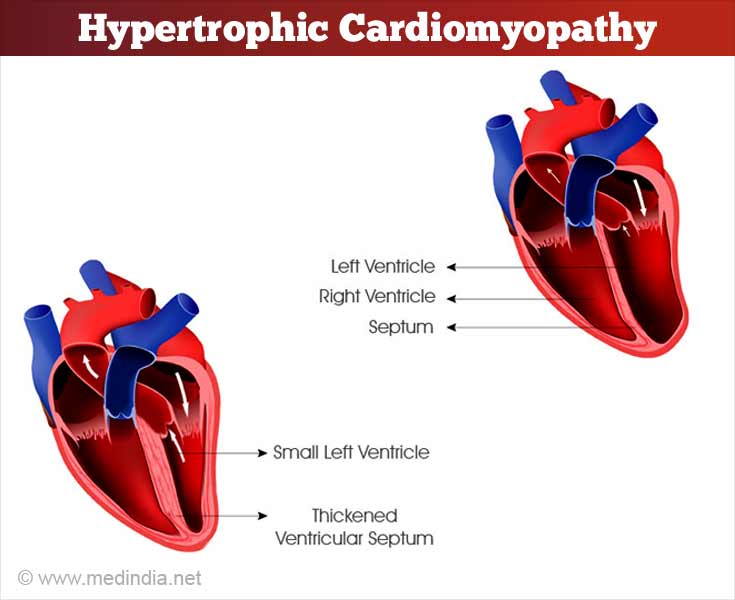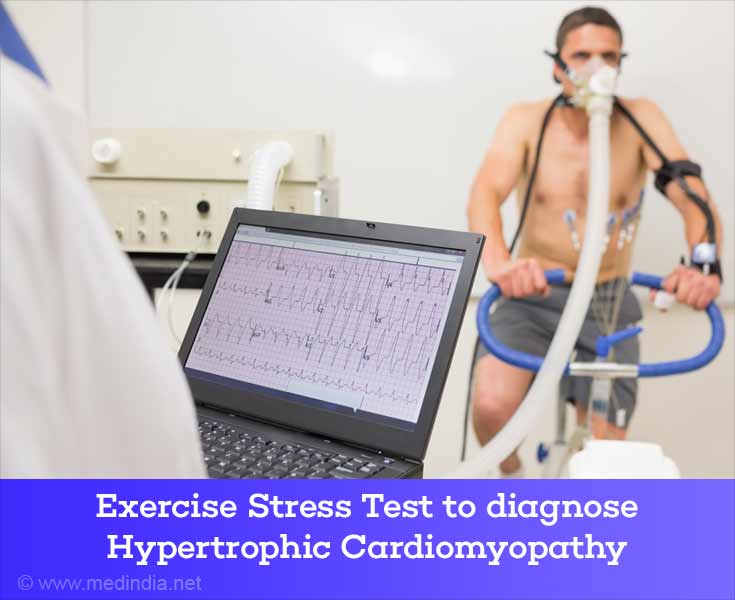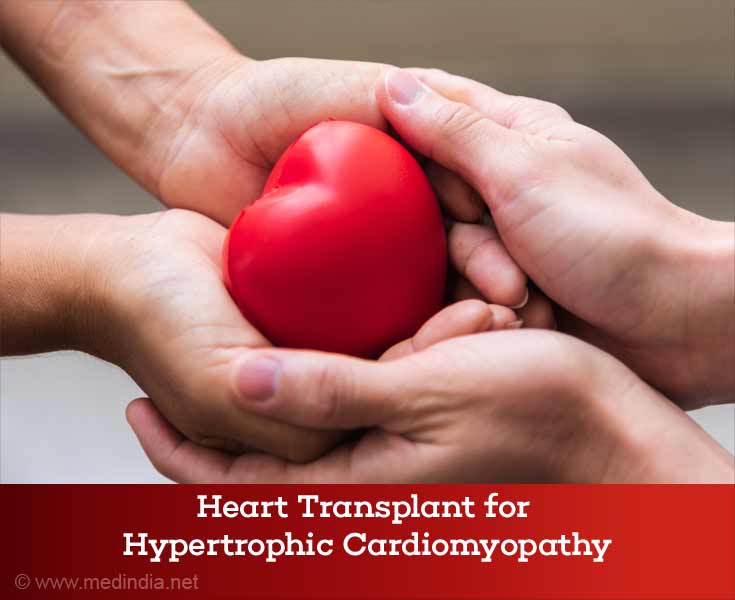- Hypertrophic cardiomyopathy - (http://www.mayoclinic.org/diseases-conditions/hypertrophic-cardiomyopathy/home/ovc-20122102)
- About Hypertrophic Cardiomyopathy - (http://www.heart.org/heartorg/conditions/more/cardiomyopathy/hypertrophic-cardiomyopathy_ucm_444317_article.jsp)
- Sisakian, H. (2014). Cardiomyopathies: Evolution of pathogenesis concepts and potential for new therapies. World Journal of Cardiology, 6(6), 478-494. http://doi.org/10.4330/wjc.v6.i6.478
- Marsiglia, J. D. C., & Pereira, A. C. (2014). Hypertrophic Cardiomyopathy: How do Mutations Lead to Disease? Arquivos Brasileiros de Cardiologia, 102(3), 295-304. http://doi.org/10.5935/abc.20140022
- Van Tintelen, J.P., et al., Pregnancy, cardiomyopathies, and genetics. Cardiovascular Research, 2014. 101(4): p. 571-578.
- Gajewski, K.K. and J.P. Saul, Sudden cardiac death in children and adolescents (excluding Sudden Infant Death Syndrome). Annals of Pediatric Cardiology, 2010. 3(2): p. 107-112.
- Hoey, E. T. D., Elassaly, M., Ganeshan, A., Watkin, R. W., & Simpson, H. (2014). The role of magnetic resonance imaging in hypertrophic cardiomyopathy. Quantitative Imaging in Medicine and Surgery, 4(5), 397–406. http://doi.org/10.3978/j.issn.2223-4292.2014.09.04
- Okutucu, S., K. Aytemir, and A. Oto, Glue septal ablation: A promising alternative to alcohol septal ablation. JRSM Cardiovasc Dis, 2016. 5: p. 2048004016636313
- Maron, B.J., et al., How hypertrophic cardiomyopathy became a contemporary treatable genetic disease with low mortality: Shaped by 50 years of clinical research and practice. JAMA Cardiology, 2016. 1(1): p. 98-105.
What is Hypertrophic Cardiomyopathy (HCM)?
Hypertrophic cardiomyopathy (HCM) is a condition that affects the muscle layer of the heart in patients without any underlying heart problems or systemic disease which could lead to the heart hypertrophy (enlargement).
Hypertrophic cardiomyopathy affects 1 in 500 people. It is equally distributed among the males and females. It can manifest at any age. In athletes and young adults, it can manifest as sudden cardiac arrest leading to sudden death, which leaves a high impact on the families.

Hypertrophic cardiomyopathy is of two main types.
- Hypertrophic cardiomyopathy which can lead to obstruction of the blood flow out of the left ventricle (left lower heart chamber) is called obstructive hypertrophic cardiomyopathy.
- HCM with no obstruction to the blood flow out of the left ventricle is a non-obstructive hypertrophic cardiomyopathy.
HCM usually involves the left ventricle or the septum between the two ventricles.
What are the Causes of Hypertrophic Cardiomyopathy (HCM)?
The Role of Genetics in Hypertrophic Cardiomyopathy: HCM is a genetic disorder, autosomal dominant in inheritance. It is due to mutations in the genes that help in the formation of proteins of the heart muscle that are involved in its contraction.
Conditions like high blood pressure, diabetes, and thyroid disease can cause the heart muscle thickening.
What are the Symptoms of Hypertrophic Cardiomyopathy (HCM)?
Patients with hypertrophic cardiomyopathy have a variable presentation. HCM can present at any age. Also, few people do not present with any symptoms. A few patients die suddenly without any previous symptoms.
Symptoms of HCM are due to:
- Thickened heart muscle leading to the increased oxygen demand
- Stiffening of the ventricular wall, and narrowed left ventricular blood outlet, resulting in reduced blood supply to the body
- Weakness of the heart muscle in due course resulting in decreased force of pumping out blood
- Mitral valve insufficiency and backpressure to the left atrium (left upper heart chamber) and lungs
- Disorganized heart muscle fibers, resulting in abnormal electrical activity of the heart
The patients can present with shortness of breath, chest pain, palpitations (abnormal sensation of one’s own heart beats), dizziness, syncope, heart failure and sudden cardiac arrest. Exertion aggravates the symptoms.

HCM in Athletes: In hypertrophic cardiomyopathy, not only the muscle layer of the heart is thickened but also the arrangement of the muscle fibers in the heart is disorganized. The disorganized heart muscle arrangement can lead to the abnormal electrical heart activity and result in a sudden arrest and death. Usually, the sudden death is seen more on exertion. Therefore, it is important for the athletes to be conscious of the presence of hypertrophic cardiomyopathy in the family and to undergo proper health screen.
HCM during Pregnancy: In pregnant women with hypertrophic cardiomyopathy, the symptoms which the patient had before the pregnancy are aggravated. Regular echocardiographic examination depending upon the symptom severity and administration of the medications belonging to the beta blocker group are essential in symptomatic patients. Patients with hypertrophic cardiomyopathy frequently stand the pregnancy well.
How do you Diagnose Hypertrophic Cardiomyopathy (HCM)?
Diagnosis of hypertrophic cardiomyopathy is based on the following tests:
Electrocardiogram (ECG) helps detect abnormal heart rhythm as well as the thickened ventricle in these patients.
Echocardiogram is a test where a small device is placed over the chest wall and the heart is viewed on a monitor in the different views. The heart chambers, the valves in the heart, the wall thickness and the dynamics of blood flow are measured and monitored.
Exercise Stress Test: In this test the patient is asked to walk on a treadmill, and report any symptoms. The blood pressure, heart rhythm and the breath are monitored by the technician. It is sometimes done along with echocardiogram.

Chest X-Ray can show an enlarged heart image in these patients.
Cardiac Catheterization is a procedure to see the blood vessels which supply the blood to the heart. This test is not frequently used in these patients.
Cardiac Magnetic Resonance Imaging: Electromagnetic waves are used in this imaging technique. It is an important investigation to establish the presence of hypertrophic cardiomyopathy in recent times.
Genetic Testing is done to detect the presence of mutated genes.
How do you Treat Hypertrophic Cardiomyopathy (HCM)?
Hypertrophic cardiomyopathy is treated with the following approaches:
The medications beta blockers, verapamil and diltiazem are used for the effective heart function.
Disopyramide and amiodarone are antiarrhythmic agents used to correct the heart rhythm.
Alcohol Septal Ablation: This is a procedure by which the portion of thickened heart muscle is destroyed by injecting alcohol into the blood vessel supplying to the septum. However, the procedure can lead to the heart rhythm disturbances.
Glue Septal Ablation: This procedure is similar to alcohol septal ablation, but instead of alcohol, glue (n-butyl cyanoacrylate) is injected. This appears to be a superior and effective method.
Septal Myectomy: In this procedure, the thickened portion of the heart muscle in the septum is surgically removed through an open heart procedure.
Implantable Cardioverter Defibrillator: This small device is placed beneath the skin and connected to the heart through leads (wires). It is useful for patients with life-threatening abnormal heart rhythm problems (arrhythmias). It instantly delivers a therapeutic dose of shock to the heart and prevents the patient from sudden cardiac arrest and death.
Heart Transplant: This is the only option for the patients with severe heart failure with no response to medical management.

How do you Prevent Hypertrophic Cardiomyopathy (HCM)?
HCM is not a preventable heart condition. But sudden death in the young adults with hypertrophic cardiomyopathy is preventable. To prevent sudden death, participation in the strenuous activity is not encouraged among HCM patients.
Pre-participation Evaluation before any sport is essential to diagnose the condition early and hence prevent the sudden death among athletes.
Implantable Cardioverter Defibrillator (ICD): To prevent the sudden death in patients with HCM due to the life-threatening arrhythmias, ICD implantation is essential.








